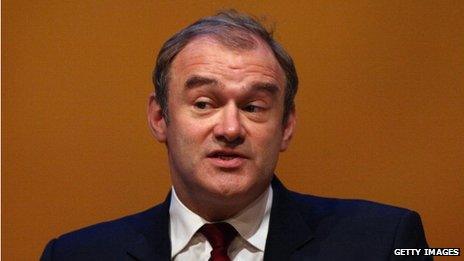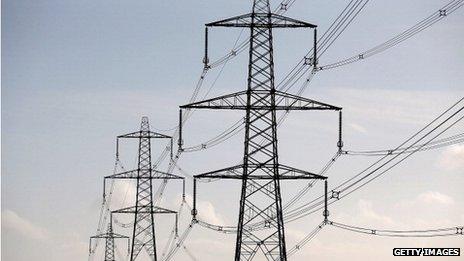Ed Davey's letter to regulators
- Published

The Energy Secretary, Ed Davey, has written to the regulators Ofgem and the CMA raising questions about the dominance of British Gas. The full text of his letter to Andrew Wright, chief executive of Ofgem, is below:
Dear Andrew,
Many thanks for our meeting on Monday concerning the annual energy market assessment which is being carried out by OFGEM, OFT and CMA. As we discussed it is vital that your work is clearly independent and I want to reiterate that I want you to feel that you can recommend any one of a range of things ranging from no action to a full market investigation reference.
I am also keen that in making your recommendations you take into account potential impacts on investment and hence security of supply as this clearly significantly affects GB consumers
However I want to reiterate that there are three areas which I am particularly keen you focus on. These issues which could have significant benefit for the consumer have had little if any focus in public discussions on the energy market and the competition assessment,
The gas supply market
Most commentary has looked at alleged problems in the electricity market. These include the benefits or otherwise of vertical integration, the liquidity and transparency of the wholesale electricity market and whether there is a case for reintroducing a power pool. As you know OFGEM and the government have been acting on many of these issues. However for the 85% of households who are connected to the gas grid two thirds of their energy bill is accounted for by gas rather than electricity.
The gas market has little vertical integration and analysis of the profit margins of the energy companies shows that the average profit margin for gas is around three times that of electricity. For some companies the profit margin is actually more than 5 times the average profit being made on supplying household electricity.
There is also evidence that British Gas, the company with the largest share of the gas domestic supply market, has tended to charge one of the highest prices over the past 3 years, and has been on average the most profitable. I attach a short analysis note highlighting some of this evidence. If the profit margin in the domestic gas supply market were similar to that in the domestic electricity market the average saving per household per annum could be up to £40.
Clearly you will wish to consider whether this is prima facie evidence of an issue in the market and so whether it merits a market investigation reference with the whole gamut of potential remedies that could follow including a break up of any companies found to have monopoly power to the detriment of the consumer. Alternatively you may of course conclude that no action is needed or potentially some intermediate measure which can be taken by the sector regulator.

Interconnection
Analysis consistently shows that Great Britain is relatively poorly interconnected to other power markets at 5% of capacity compared to a more optimal percentage of around 10%. Recent National Grid estimates have indicated that improved electricity interconnection could save up to £1billion pa or around £11 per household. As we introduce increasing intermittency in our generation mix the need for increased interconnection will be greater and will enhance competition in the wholesale electricity market.
At the end of last year DECC published its interconnection strategy but we would be keen if your work were to indicate what benefits there might be for competition and for consumers from further steps towards completion of a Single European Energy market of which interconnection could play an important part. I also would like you to examine whether there would be any merit in further gas pipeline interconnection with Europe.
Whilst our gas prices including tax relative to rest of Europe are relatively low I think there is some evidence that this is not the case once adjustments are made for tax and distribution costs. Would further gas pipeline interconnection help to drive down gas wholesale costs?
New business models
The most effective way to reduce consumer bills is to improve the energy efficiency of our homes. This is also one of the most effective ways to reduce our carbon emissions. However one of the longstanding concerns about the current energy supply market is that the current Big 6 energy suppliers still see their role as selling gas and electricity rather than having a different business model where the value proposition is to save households energy.
This has been seen most recently where the Big 6 have been slow to embrace the Green Deal, and in a number of cases the Energy Company Obligation, As part of Electricity Market Reform we are seeking to promote Electricity Demand Reduction (EDR) and this year will be launching a number of EDR pilots as part of these efforts. I am particularly keen therefore that the market is encouraged to develop in such a way as to promote energy efficiency.
My officials would be happy to discuss any of these points further if you wish as you develop your analysis and thoughts.
Ed Davey